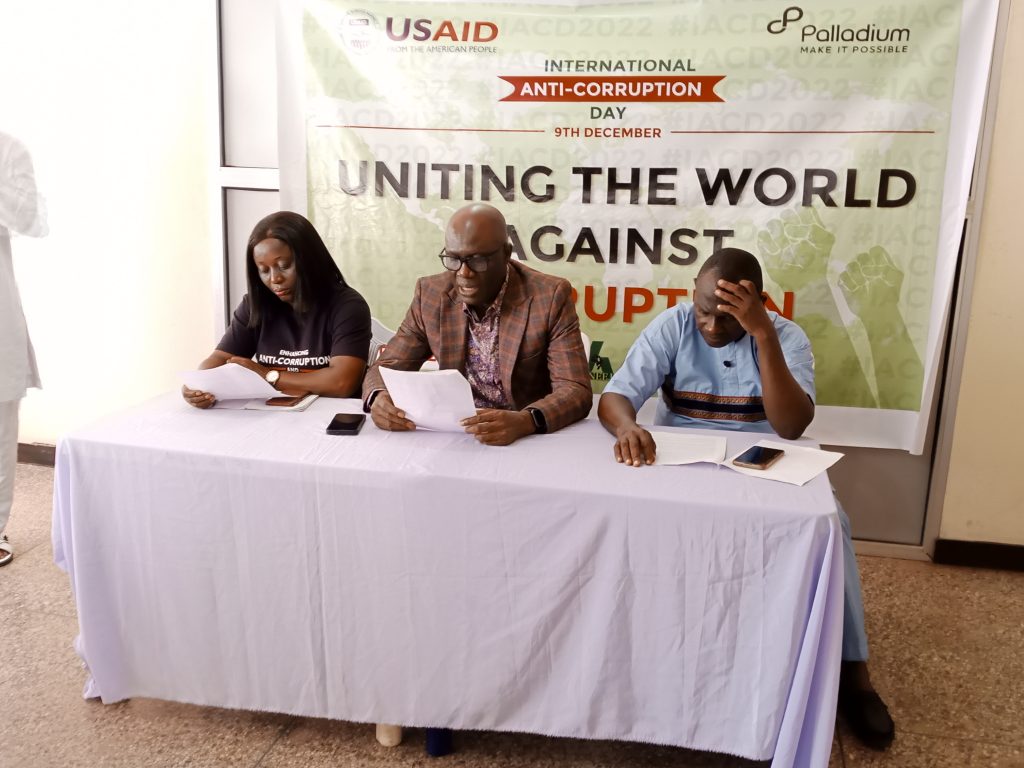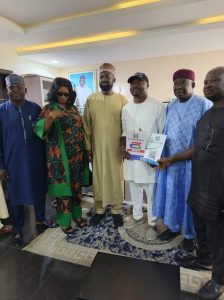2022 Anti-Corruption Day: ANEEJ Urges Stakeholders To Join Forces Against Corruption In Society

…Appreciates Palladium, USAID For Assisting ANEEJ to implement the “enhancing Anti-Corruption and Social Inclusive Reform Initiative in Nigeria”
By Simeon OSAJIE
The Africa Network for Environment and Economic Justice (ANEEJ) has called on the governments, private sectors, non-governmental organizations, the media and citizens around the world to join forces to fight corruption in the society.
The call is part of the ANEEJ’s programmes to mark this 2022 International Anti-Corruption Day.
In a press briefing in Benin City office of the agency, the Executive Director of ANEEJ, David Ugolor urged the federal government to immediately inaugurate the Inter-Ministerial Committee (IMC) as provided for by the strategy document as the IMC has the responsibility to facilitate the Anti-corruption Funding Framework (AFF) and the development of sector-specific strategies for the implementation of NACS. “We are also urging the federal government to properly fund the implementation of the strategy as against what happened with the 1st anti-corruption strategy.”
According to Ugolor, who was represented by the Deputy Executive Director, Leo Atakpo, opined that corruption is a complex social, political and economic phenomenon that affects all countries and undermines democratic institutions, slows economic development and contributes to government inefficiency and instability.
“On 31 October 2003, the UN General Assembly adopted the United Nations Convention against Corruption and requested that the Secretary-General designate the United Nations Office on Drugs and Crime (UNODC) as secretariat for the Convention’s Conference of States Parties (resolution 58/4). Since then, 188 parties have committed to the Convention’s anti-corruption obligations, showing near-universal recognition of the importance of good governance, accountability, and political commitment. The Assembly also designated 9th December as International Anti-Corruption Day, to raise awareness on corruption and of the role of the Convention in combating and preventing it.
“Corruption attacks the foundation of democratic institutions by distorting electoral processes, perverting the rule of law and creating bureaucratic quagmires. Economic development is stunted, foreign direct investment is discouraged and small businesses within the country often find it difficult to survive. You all know the figures, inflation rate was 21.09% in October 2022, exchange rate is around N750/USD in the black market in the midst of rising debt profile. Expectedly, majority of Nigerians are poor as a recent report released by the Nigeria Bureau of Statistics (NBS) showed that no fewer than 133 million Nigerians, representing 63 per cent of the population were living in multi-dimensional poverty.
“There are growing concerns about how the government both at federal, states and local government are managing our collective resources. We all read in the media a few days ago that Niger Delta State government got about N625.4 bn as refund of 13% oil derivation, subsidy and SURE-P from the federal account in the last two years (2021 — 2022). This was kept secret until a particular governor in the Niger Delta made the revelation. These resources have not translated significantly to improving the living condition of the people. The people must now begin to hold government to account on the use of public funds,” he said.
ANEEJ also used the opportunity of this year’s event to raise key issues that will support the implementation of Nigeria’s anti-corruption framework.
“We equally encourage the FG to provide support to the Inter-Agency Task Team (IATT) to meet quarterly to promote learning and collaboration amongst anti-corruption agencies in Nigeria.
“We are encouraged by the effort of Nigerian government in concluding work on some anticorruption laws as we now have the Proceeds of Crime Recovery and Management Act 2022, the Money Laundering Prevention and Prohibition Act 2022 and the Terrorism Prevention and Prohibition Act 2022. However, the Witness Protection and Management Bill and the Public Interest Disclosure and Protection Bill 2022, (Whistleblower Bill) are still pending. We urge the Presidential Initiative for Continuous Audit (PICA) within the Federal Ministry of Finance and the National Assembly to do the needful, to conclude work on these pending anti-corruption bills.
“To facilitate the implementation of the Proceeds of Crime Recovery and Management Act 2022, the Attorney General of the federation is required to issue a guideline and all the agencies listed in the Act (such as EFCC, ICPC, NFIU, NAFDAC, NAPTIP, NIS, etc) are equally expected to constitute the Proceed of Crime Management Directorate that will play a key role in the implementation of the Act. We expect these individuals and organizations to move quickly to deliver on their responsibilities.
“Again, we urge State governments to use the huge resources at their disposal judiciously and transparently to build critical infrastructures and improve the living standard of the citizens, especially those of the Niger Delta region, who in addition to the month allocation are also receiving 13% oil derivation fund.
“I want to specially appreciate Palladium and USAID for providing the resources for ANEEJ and the anti-corruption cluster to implement the ‘Enhancing Anti-corruption and Social Inclusive Reform Initiatives in Nigeria’ project.”




